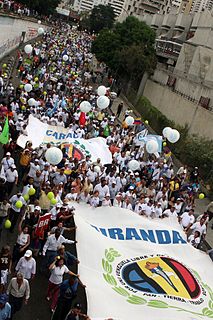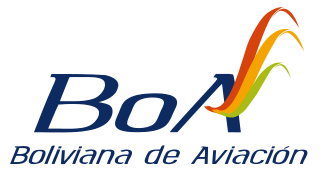
WSTE-DT, virtual and VHF digital channel 7, branded on air as Teleisla, is an independent television station serving San Juan, Puerto Rico that is licensed to Ponce. The station is owned by the Univision Local Media subsidiary of Univision Communications, as part of a duopoly with Caguas-licensed Univision owned-and-operated station WLII-DT ; it is also sister to radio stations WKAQ and WKAQ-FM (104.7). These stations share studios on Calle Carazo in Guaynabo. WSTE maintains a network of five transmitter sites, located at Cerro Maravilla in Ponce, at Cerro La Marquesa in Aguas Buenas, at Cerro Canta Gallo in Aguada, on Highway 22 in Arecibo, and at the Monte del Estado in Mayagüez.

The Andean Community is a customs union comprising the South American countries of Bolivia, Colombia, Ecuador, and Peru. The trade bloc was called the Andean Pact until 1996 and came into existence when the Cartagena Agreement was signed in 1969. Its headquarters are in Lima, Peru.
Digital terrestrial television is a technology for broadcast television in which land-based (terrestrial) television stations broadcast television content by radio waves to televisions in consumers' residences in a digital format. DTTV is a major technological advance over the previous analog television, and has largely replaced analog which had been in common use since the middle of the last century. Test broadcasts began in 1998 with the changeover to DTTV beginning in 2006 and is now complete in many countries. The advantages of digital terrestrial television are similar to those obtained by digitising platforms such as cable TV, satellite, and telecommunications: more efficient use of limited radio spectrum bandwidth, provision of more television channels than analog, better quality images, and potentially lower operating costs for broadcasters.
Televisión Nacional de Chile (TVN) is a Chilean public service broadcaster. It was founded by order of President Eduardo Frei Montalva and it was launched nationwide on 24 October 1969. Since then, the company has been reorganized on several occasions and its operations areas have increased over the years, becoming one of the leading television broadcaster in Chile and South America. The law 17 377 of 1970 established that TVN must be a public, autonomous, pluralistic and representative public service. In 2018 changes were introduced in his public mission with the adoption of the act 21 085 that determined the obligation to promote the national cultural identity, the values of democracy, human rights, care for the environment and respect for diversity. Furthermore, TVN governs the programming of its services according to criteria established by the National Television Council (CNTV).

Cochabamba is a city and municipality in central Bolivia in a valley in the Andes mountain range. It is the capital of the Cochabamba Department and the fourth largest city in Bolivia, with a population of 630,587 according to the 2012 Bolivian census. Its name is from a compound of the Quechua words qucha "lake" and pampa, "open plain." Residents of the city and the surrounding areas are commonly referred to as cochalas or, more formally, cochabambinos.
Compañía Boliviana de Transporte Aéreo Privado Aerosur, S.A., shortened and styled AeroSur, was a privately owned airline from Bolivia, which served as the country's flag carrier since 1998, along with state-owned Boliviana de Aviación. Headquartered in Santa Cruz de la Sierra, it operated a network of domestic and international scheduled passenger flights with its hub at the city's Viru Viru International Airport. As of 2010, the airline had 1200 employees.
Telesur is a Latin American terrestrial and satellite television network headquartered in Caracas, Venezuela and sponsored primarily by the government of Venezuela, with additional funding from the governments of Cuba, Nicaragua, Uruguay, and Bolivia. It was launched in 2005, under the government of Hugo Chavez, with the aim of being "a Latin socialist answer to CNN".
Martin Smedberg-Dalence is a Swedish-born Bolivian footballer who plays for Club Bolívar as a right midfielder.

KCSG, virtual channel 8, is a MeTV-owned-and-operated television station licensed to Cedar City, Utah, United States. Owned by Weigel Broadcasting, the station maintains studio facilities located on West 1600 South Street in St. George, and its transmitter is located on Cedar Mountain, southeast of Cedar City. The station has a network of about 15 broadcast translators that extend its over-the-air coverage throughout southwestern Utah. KCSG is also available on DirecTV, Dish Network, Galaxy 19, and cable systems throughout the geographically large Salt Lake City market.

WIPR-TV is a non-commercial educational, full-power public television station located in San Juan, Puerto Rico, transmitting over virtual channel 6, digital 26. The station is owned and operated by Corporación de Puerto Rico para la Difusión Pública. Most of its television shows on the main channel are local programming.

This is a list of when the first publicly announced television broadcasts occurred in the mentioned countries. Non-public field tests and closed circuit demonstrations are not included. This list should not be interpreted to mean the whole of a country had television service by the specified date. For example, the United States, Great Britain, Germany, and the former Soviet Union all had operational television stations and a limited number of viewers by the year 1939. However, in those countries, only very few cities in each country had television service. Television broadcasts were not yet available in most places.
KFRE-TV, virtual channel 59, is a CW-affiliated television station serving Fresno, California, United States that is licensed to Sanger. The station is owned by the Sinclair Broadcast Group, as part of a duopoly with Visalia-licensed Fox affiliate KMPH-TV. The two stations share studios on McKinley Avenue in eastern Fresno ; KFRE's transmitter is located on Bear Mountain.

Radio Caracas Televisión (RCTV) was a Venezuelan free-to-air television network headquartered in the Caracas neighborhood of Quinta Crespo. It was sometimes referred to as the Canal de Bárcenas. Owned by Empresas 1BC, Radio Caracas Televisión (RCTV) was inaugurated on 15 November 1953 by William H. Phelps, Jr.. Its radio counterpart was Radio Caracas Radio.

Argentina–Chile relations refers to international relations between the Republic of Chile and the Argentine Republic. Argentina and Chile share the world's third-longest international border, which is 5,300 km (3,300 mi) long and runs from north to the south along the Andes mountains. Although gaining their independence during the South American wars of liberation, during much of the 19th and the 20th century relations between the countries were chilled as a result of disputes over the border in Patagonia, although Chile and Argentina have never engaged in a war. In recent years relations have improved dramatically. Despite increased trade between the two countries, Argentina and Chile have followed quite different economic policies. Chile has signed free trade agreements with countries such as China, the USA, Canada, South Korea and the EU and is an active member of the APEC, while Argentina belongs to the Mercosur regional free trade area. In April 2018, both countries suspended membership of the Union of South American Nations.

TVes is a Venezuelan public television channel. Its name is short for Televisora Venezolana Social and is pronounced [ˈte ˈβes], meaning you see yourself. It replaced the signal of Radio Caracas Televisión on Channel 2 on Monday, May 28, 2007, and began broadcasting at 12:20 a.m. local time. The Venezuelan government had refused to renew RCTV's broadcasting license and instead determined to create a new channel from part of RCTV's infrastructure. The new channel, in contrast with RCTV, is public-owned. According to the government, TVes aims to portray the identity of Venezuelans, hence the pronunciation of the station's name meaning you see yourself.

The RCTV protests were a series of protests in Venezuela that began in the middle of May 2007. The cause of the protests was the refusal by the government to renew the broadcasting license of Venezuela's oldest private television network, Radio Caracas Televisión (RCTV), instead creating a new public service channel called TVes which began operations on 28 May, the same day RCTV's license expired. RCTV had Venezuela's largest viewing audience, with 10 million of the country's 26 million people viewing its shows and soap operas.
The Bolivian Red Cross was officially founded in Bolivia on May 15, 1917. It has its headquarters in La Paz.

The Bolivian Constituent Assembly, convened on August 6, 2006 in Sucre, with the purpose of drafting a new national constitution by December 14, 2007; extended from the original deadline of August 6, 2007. The Assembly approved the new Political Constitution of the State on 9 December 2007. It was put to a national referendum held on 25 January 2009, and went into force on 7 February 2009.
The UNASUR Constitutive Treaty, officially the Constitutive Treaty of the Union of South American Nations, was signed on May 23, 2008 during the extraordinary summit of heads of state and government of the Union of South American Nations (UNASUR) held in Brasília, Brazil. It officially established the Union of South American Nations, a intergovernmental continental union of twelve South American nations.

Boliviana de Aviación, often referred to as simply BoA, is the flag carrier airline of Bolivia and is wholly owned by the country's government. It was established in October 2007 and began operations in March 2009. The airline is headquartered in Cochabamba with its main hub at Jorge Wilstermann International Airport and focus cities at El Alto International Airport and Viru Viru International Airport. Most international flights, however, including long-haul services to Madrid and Miami operate out of Viru Viru in Santa Cruz de la Sierra. Boliviana de Aviación currently flies to 13 destinations in 5 countries and is the largest airline in Bolivia in terms of fleet size and passengers carried.














